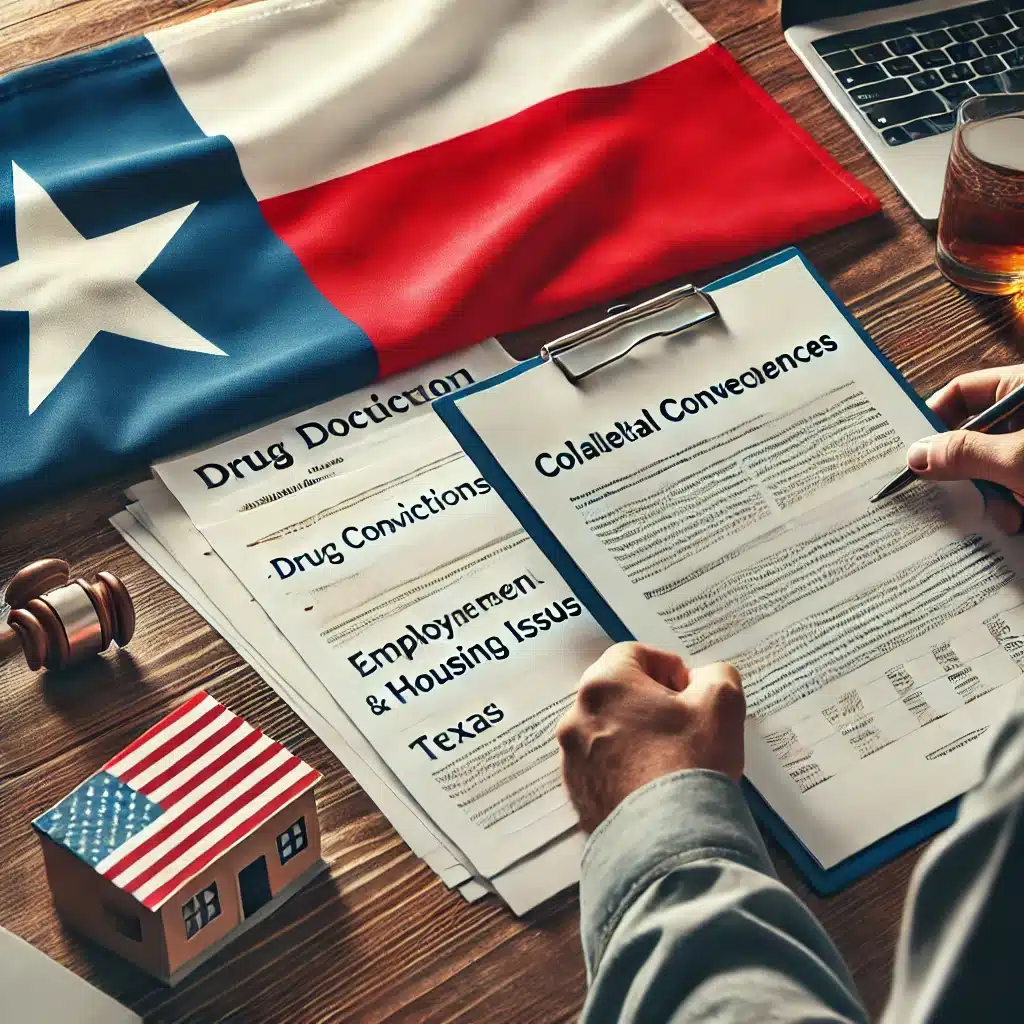Texas drug conviction consequences reach far beyond the courtroom, impacting nearly every part of a person’s life. From employment and housing opportunities to education and family relationships, a single conviction can trigger long-term setbacks. Understanding the full scope of Texas drug conviction consequences is essential for anyone facing charges or working through the legal system. Being informed allows individuals to make strategic decisions, seek proper legal representation, and take steps toward rebuilding their future.

Texas has some notably stringent drug laws, and understanding them is crucial, whether you’re a resident or just interested in the legal landscape. So, let’s break it down:
- Possession: When it comes to drug possession, Texas classifies controlled substances into penalty groups, ranging from Group 1 (most severe) to Group 4 (least severe). In such instances, one requires the services of a drug possession attorney. Penalties for possession can include fines and incarceration. For example, possessing less than one gram of a Group 1 substance like cocaine can result in a state jail felony with up to 2 years in jail and a fine of up to $10,000.
- Distribution: If you’re caught distributing drugs, the penalties can be even more severe. The amount and type of substance involved play a significant role in determining the punishment. Distributing larger quantities or near schools and other specific locations can lead to enhanced charges and more substantial sentences.
- Drug Trafficking: Texas is a major corridor for drug trafficking due to its proximity to the Mexican border. Trafficking offenses can lead to substantial prison sentences, sometimes even life imprisonment, along with hefty fines. This is particularly true for large-scale operations involving significant amounts of controlled substances.
- Mandatory Minimums: Texas enforces mandatory minimum sentences for certain drug offenses. This means that, if convicted, judges have limited discretion in sentencing, and offenders may face lengthy prison terms.
- Alternative Sentencing: In some cases, especially for first-time offenders, Texas offers diversion programs or probation in lieu of jail time. These programs focus on rehabilitation and education, aiming to help individuals reintegrate into society.
- Changes in Legislation: It’s worth noting that drug laws can change over time, and Texas has made efforts to reform some aspects of its drug policies, especially for low-level possession offenses. Laws regarding marijuana have evolved as well, with some counties and cities decriminalizing small amounts for personal use.
- Legalization and Medical Use: While Texas has taken steps toward medical cannabis legalization, it remains a relatively limited program, primarily serving patients with specific medical conditions. Recreational use of marijuana remains illegal.
Drug convictions in Texas can have serious consequences, and the specific penalties depend on various factors, including the type and amount of the substance involved, prior criminal history, and location of the offense.

The Process Of Drug Convictions In Texas
In Texas, drug convictions are a significant legal matter. It all begins when someone gets arrested for a drug-related offense, which could include drug possession, manufacturing, trafficking, or distribution. After the arrest, there’s a legal journey that unfolds. First, the accused goes through the pre-trial process. During this phase, evidence is collected, and both the prosecution and defense prepare their cases. There might be negotiations for plea bargains or pre-trial diversion programs, especially for first-time offenders, which can offer an opportunity for rehabilitation rather than immediate incarceration.
If the case proceeds to trial, a judge and a jury will be involved. The prosecution presents its case, and the defense counters. The judge instructs the jury on the applicable laws, and then the jury deliberates to reach a verdict. If the defendant is found guilty, the next step is sentencing. Texas has a reputation for having some of the toughest drug laws in the United States. The severity of the sentence can depend on various factors, including the type and quantity of drugs involved, any prior criminal record, and whether the offense took place in a drug-free zone (like near a school).
Sentences can range from probation, drug rehabilitation programs, or community service to hefty fines, lengthy prison terms, or parole. Texas also has mandatory minimum sentences for certain drug offenses, which means judges have limited discretion in sentencing. Texas enforces strict drug laws, but the state also takes steps to prioritize rehabilitation over punishment—especially for non-violent, first-time offenders. Courts now operate specialized drug dockets that focus on treatment and recovery. These drug courts help individuals address addiction and reduce the risk of incarceration.
In recent years, there has been a growing recognition that the “war on drugs” approach might not be the most effective way to address drug-related issues. Alternatives such as drug treatment programs, mental health support, and diversion initiatives have gained traction. If you ever find yourself facing drug charges in Texas, it’s crucial to seek legal counsel from a drug charge lawyer who specializes in criminal defense. They can guide you through the complex legal process and help you make informed decisions.
Remember, the legal landscape around drug convictions can change, so it’s essential to stay informed about the latest developments in Texas drug laws. And always, making wise choices is the best way to avoid getting tangled up in this kind of situation.
The Collateral Consequences Of Drug Convictions In Texas
Employment:
Now, when it comes to jobs, a drug conviction can make the path a bit rockier. Employers often conduct background checks, and a criminal record, especially a drug-related one, can raise concerns. However, there are resources available to help individuals with convictions find employment, such as reentry programs and organizations that connect them with understanding employers.
Housing:
Finding a place to call home can be another challenge. Landlords may be hesitant to rent to individuals with drug convictions, and certain government housing assistance programs may have restrictions. It’s essential to explore your options, including programs that support those in reentry, as they can provide guidance on housing.
Voting Rights:
In the Lone Star State, individuals with felony drug convictions temporarily lose their voting rights while incarcerated. However, once they’ve completed their sentence, including any parole or probation, these rights can be restored. It’s crucial for individuals to be aware of this process and work on reinstating their ability to participate in the democratic process.
Education:
Now, when it comes to education, financial aid can be a hurdle. Some federal and state financial aid programs are off-limits to individuals with drug convictions. This can be particularly challenging for those aiming to pursue higher education. But don’t lose hope; there are still scholarships and grants available that don’t take your criminal history into account.
Social Stigma and Relationships:
Beyond the legal consequences, there’s also the issue of social stigma. People with drug convictions may face judgment and discrimination, which can affect their personal relationships and social interactions. It’s a sad truth, but it’s important to stay resilient and seek support from friends, family, or support groups.
Rehabilitation and Reintegration:
The good news is that Texas has been working on initiatives to help individuals reintegrate into society successfully. Programs like drug courts focus on Texas drug rehab rather than punishment. They offer treatment and support to address the root causes of drug-related offenses, aiming to reduce recidivism.

In conclusion, Texas drug conviction consequences can be far-reaching, affecting employment, housing, education, and personal relationships. Yet, the legal landscape is slowly shifting as reform efforts gain momentum across the state. For those dealing with the impact of a conviction, connecting with legal professionals and reentry programs can make a meaningful difference. With the right support and determination, individuals can overcome these setbacks and take positive steps toward rebuilding their lives.
Other Related Articles:
- Spotlight On The Courts: Turning The Tide Of A Wrongful Conviction
- The Consequences of Drug Trafficking in Texas
- An Emerging Case Of Drug Dealer Caught At The Airport
- CPS Drug Testing in Texas: First Visits Unveiled!
- The Significance of CPS Drug Test Results
- Types of Drug Tests Used by CPS in Texas
- Understanding CPS Drug Testing Laws in Texas: A Comprehensive Guide
- CPS Drug Testing at Home in Texas: Legal Procedures and Implications
- Failing a CPS Drug Test for Marijuana in Texas
- What to Do When CPS Asks for a Drug Test in Texas
FAQs
Yes, there have been efforts to reform some aspects of Texas’ drug policies, especially for low-level possession offenses. Laws regarding marijuana have also evolved, with some counties and cities decriminalizing small amounts for personal use.
Yes, individuals with felony drug convictions in Texas temporarily lose their voting rights while incarcerated. However, once they’ve completed their sentence, including any parole or probation, these rights can be restored.
Reentry programs and organizations connect individuals with understanding employers. These resources can be valuable for those seeking employment despite their criminal record.
Facing social stigma can be challenging, but seeking support from friends, family, or support groups can help individuals navigate this aspect of life after a drug conviction.
Yes, Texas has implemented programs like drug courts that focus on rehabilitation rather than punishment. These programs offer treatment and support to address the root causes of drug-related offenses, aiming to reduce recidivism.



